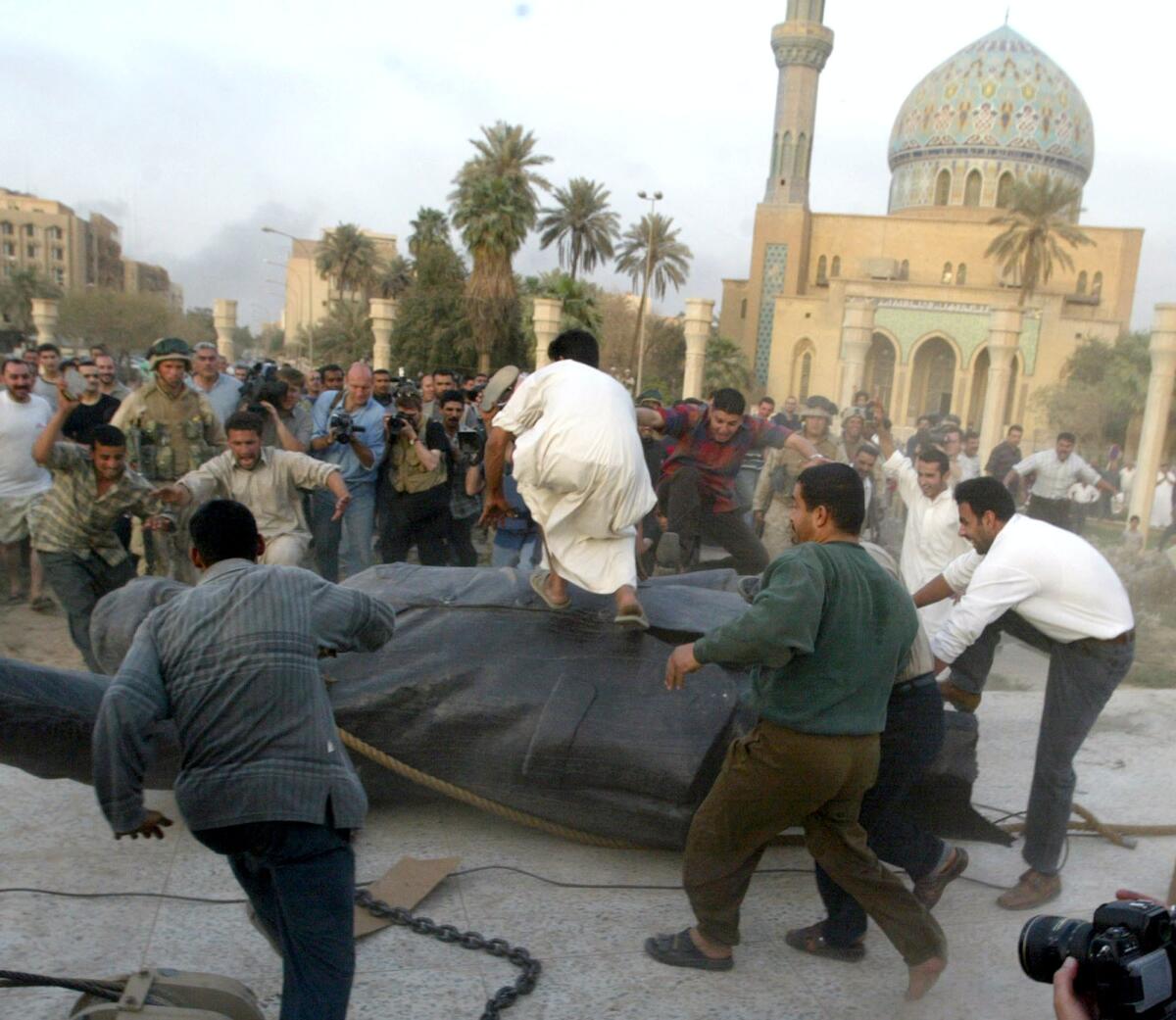Column: Democrats and Republicans agree--regime change is out of fashion

Iraqi civilians rush to the torn down statue of then Iraqi President Saddam Hussein in Bagdad on April 9, 2003.
Whatever happened to regime change?
Not long ago, Republicans and Democrats alike thought one of the best ways to repair the broken parts of the world was to replace dictatorships with democracies. George W. Bush was expansive, proclaiming a “freedom agenda” that he hoped would transform the entire Middle East, beginning with Iraq. Barack Obama rejected much of his predecessor’s foreign policy, but he used military force to help oust Libya’s Moammar Kadafi and promised that Syria’s Bashar Assad would be next.
Interventionism has become downright unfashionable.
These days, that sort of interventionism has become downright unfashionable.
At last week’s Republican debate in Las Vegas, three of the party’s top four candidates denounced Obama and his former secretary of State, Democratic front-runner Hillary Clinton, for seeking regime change in Syria.
“Obama, Clinton and far too many Republicans want to topple Assad,” Ted Cruz complained. “If we topple Assad, [Islamic State] will take over.” Donald Trump and Ben Carson agreed, as did Rand Paul.
“We’ve spent $4 trillion trying to topple various people … and for what?” Trump said. “It’s not like we had victory. It’s a mess.”
Cruz and his colleagues must have missed what Obama’s current secretary of State said earlier the same day. “The United States and its partners are not seeking so-called regime change, as it is known, in Syria,” John F. Kerry told reporters.
Kerry still wants to see Assad leave power, but he has come to the conclusion that negotiating peace is more important. Assad’s ouster can happen later.
And his priorities, of course, reflect Obama’s.
In 2011, after the uprising against Assad started, Obama declared that the Syrian leader had to go. Now, four years later, the main U.S. target in Syria is Islamic State, not Assad, and the group is among the disparate rebel forces ranged against his leadership. If a peace settlement materializes, officials say, the United States wants to keep Assad’s bureaucracy intact to help avoid more chaos.
Obama, moreover, has repeatedly resisted proposals for U.S. military intervention in Syria, arguing that the costs are likely to come in higher than expected. By his own admission, that was one of the main lessons he learned from the U.S. intervention in Libya.
“I think we [and] our European partners underestimated the need to come in full force if you’re going to do this,” the president told the New York Times last year.
“There has to be a much more aggressive effort to rebuild societies that didn’t have any civic traditions,” he said.
“So that’s a lesson that I now apply every time I ask the question, should we intervene militarily? Do we have an answer [for] the day after?”
Although they certainly wouldn’t admit it, the Republican Party’s insurgent candidates thus have something in common with Obama: They don’t want the United States to do too much. They’d rather drop bombs on Islamic State than obsess over who rules in Damascus, or anywhere else.
Granted, not everyone in the Republican Party has abandoned Bush-era orthodoxy. Old-style hawks, including presidential candidates Marco Rubio and the ex-president’s brother Jeb Bush, have called on Obama to push harder for regime change in Syria by increasing aid to the rebels and imposing a “no-fly zone.”
Rubio actually seemed a bit shocked by his rivals’ statements at the debate, arguing that it was wrong to let dictators slaughter their own people.
“If they go, I will not shed a tear,” he said.
The divide between interventionists and skeptics has shown up among Democrats, too. Sen. Bernie Sanders, Clinton’s chief rival for the Democratic nomination, said last week that he’s less enthusiastic about regime change than she is.
“I voted against the war in Iraq,” Sanders said in an interview with the British newspaper the Guardian. “Secretary Clinton voted for that war. She was proud to have been involved in regime change in Libya, with Kadafi — without worrying, I think, about what happened the day after and the kind of instability and the rise of [Islamic State] that we have seen in Libya.”
So we could be heading for a rather surprising general election contrast. If Clinton wins her party’s nomination and Trump or Cruz wins the GOP’s, the Democratic nominee will be more hawkish than the Republican — at least when it comes to the once-bipartisan goal of regime change.
Twitter: @doylemcmanus
Follow the Opinion section on Twitter @latimesopinion and Facebook
More to Read
A cure for the common opinion
Get thought-provoking perspectives with our weekly newsletter.
You may occasionally receive promotional content from the Los Angeles Times.











